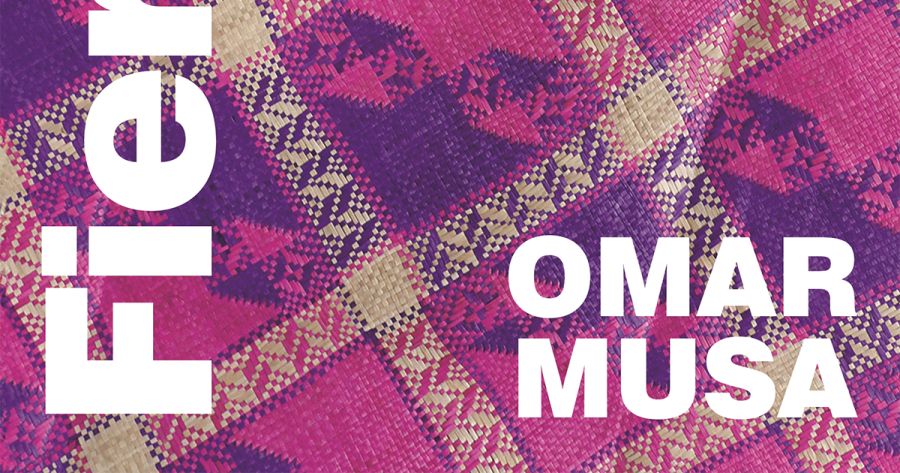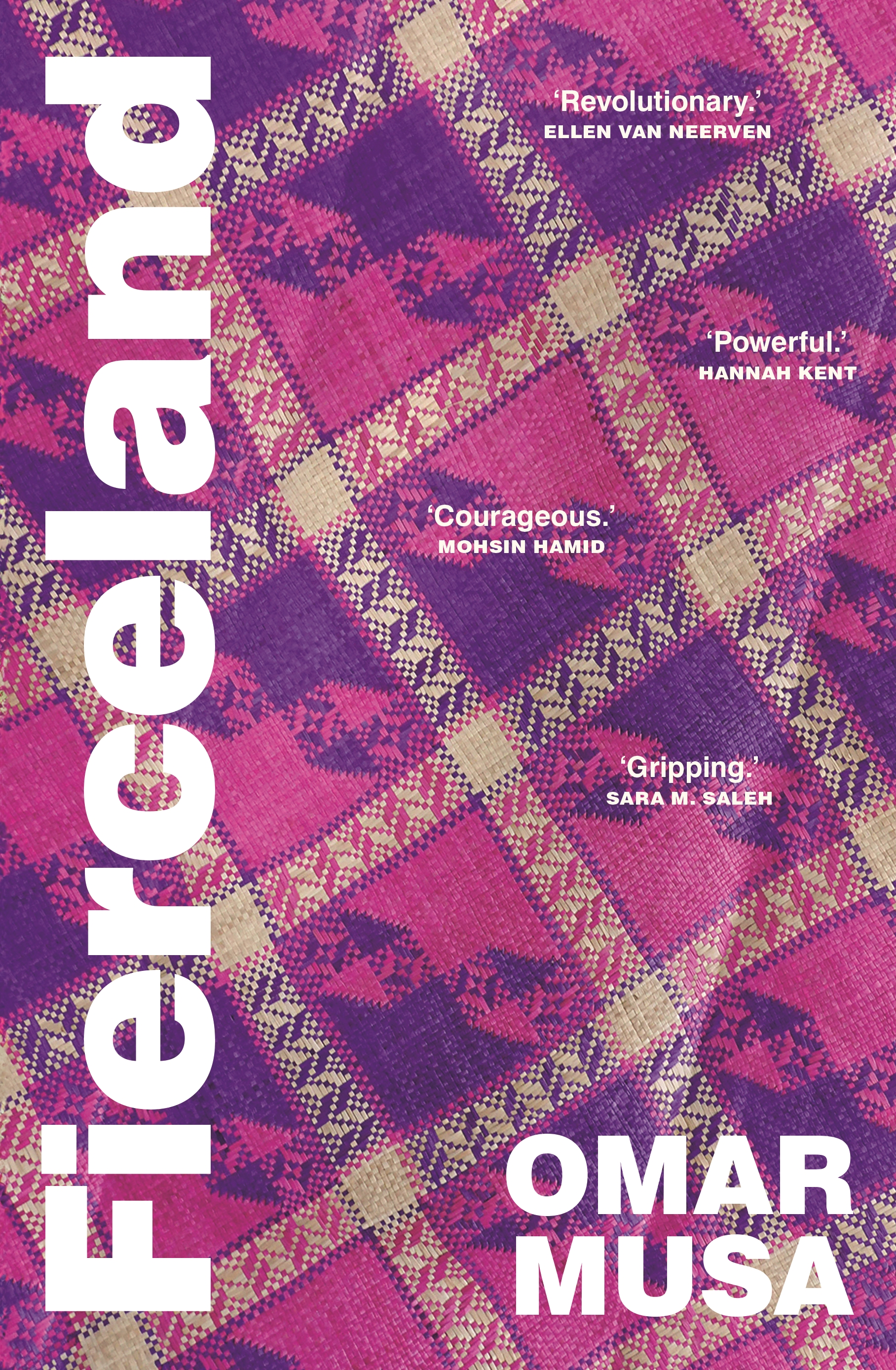
- Free Article: No
- Contents Category: Fiction
- Review Article: Yes
- Article Title: Familiar anguish
- Article Subtitle: A haunted second novel
- Online Only: No
- Custom Highlight Text:
Omar Musa’s first novel, Here Come the Dogs (2014), is a rousing dramatisation of the combustible sense of displacement and dissatisfaction simmering at the underrepresented margins of Australian life. Its protagonists are singular and compelling: each is tender and violent, hopeful and despairing, pitiful and triumphant. They all possess a uniquely hybrid identity, and each is searching for something that is always out of reach.
- Book 1 Title: Fierceland
- Book 1 Biblio: Penguin, $34.99 pb, 384 pp
- Book 1 Cover Small (400 x 600):

- Book 1 Cover (800 x 1200):

- Book 1 Readings Link: https://www.readings.com.au/product/9781926428796/fierceland--omar-musa--2025--9781926428796#rac:jokjjzr6ly9m
Fierceland is told through multiple points of view over two decades. While the novel is anchored in turn-of-the-century Malaysia and focuses on crony-capitalism that results in catastrophic deforestation in North Borneo, the action also takes place in Sydney, Benin City, Santa Monica and Venice – spanning five continents and nearly two centuries – and concludes around the time of Malaysia’s first change of government in its history, in 2018. The mood of Fierceland is tied to that political moment: the bad old regime is finally overthrown so that the new generation can, in theory, remake their world.
The first voice we encounter in Fierceland is that of the ‘Forest’. It may be a still-existent forest in North Borneo in 1998, or the ghostly voice of a vanished and vengeful forest that haunts the novel’s protagonists in later years. Next, we meet Rozana, a child who lives with her family in Kota Kinabalu, or KK, in Sabah, Malaysia. Roz differs from her younger brother Harun in most things, but they both believe in ghosts. She likes drawing and will later become an artist; he likes technology and will later become a tech designer and entrepreneur. Their father (‘Abah’ in Malay), is a businessman and their mother (‘Mak’ in Malay), is a housewife and the strategic mastermind behind their business dealings. They quickly accrue tremendous wealth through logging and palm oil plantations. We follow the siblings into adulthood as they grapple with the family’s legacy and attempt to distance themselves from the sins of their father. Like numberless contemporary novels, Fierceland revolves around a notion of ‘haunting’; it too asserts that the past is never truly past.
The patriarch, Yusuf, is the novel’s most compelling figure, alongside his friend-turned-enemy ‘Crazy Auntie’ – a poet and activist who works at the University of Sydney. Yusuf grew up impoverished in Sandakan, beside a river that flows into a forest he later destroys. He is orphaned at an early age and dependent on a kind, loyal, and illiterate older brother. Yusuf despises poverty and will do anything to avoid it. This manifests as a rapacious need to acquire and dominate.
Yusuf takes his children on what he hopes will be a formative ‘adventure’ downriver, into the forest near his childhood home. He wants them to embrace his can-do philosophy: ‘Leave the past where it is, work hard, and we can make whatever future we want.’ But Roz and Harun witness the brutality that accompanies this ethos and leave the forest traumatised. They spend the next two decades trying to forge their own paths, away from their family and Malaysia. Their father’s death prompts a return home and compels them to face their demons.
Yusuf’s older brother summarises the family’s plight succinctly. ‘[H]e never listened. He cut down every tree that he could find, like a madman. A sickness came over the family after that – something from the unseen realm.’
The ghost of their father haunts both children, and that haunting is loaded, unsubtly, with broader significance. To overcome the curse of history, to forge a new legacy and redeem past wrongs, they must reject or kill the ‘bad daddy’ in all his symbolic forms. These ‘privileged’ children of a self-made ‘great man’ have been cursed and tainted by his crimes and must find a way to appease the restless ghosts that torment them. Fierceland implies that a whole generation of wealthy Malaysians face the same task.
Readers who cringe at fiction with overt political messages can still appreciate Musa’s gift for expansive storytelling. Alongside the family saga, Fierceland offers an eventful history of a cursed glass bead (or murrina), stories of unrequited love, failed religious and colonial missions, grisly deaths, and multiple cases of madness. If the novel ultimately becomes a blunt instrument of moral instruction, Musa takes us on an enjoyable ride before slamming that instrument into our skulls.
Near the end of Fierceland, Sara – a character assigned to speak for the brutalised and dispossessed victims of Yusuf’s greed – voices a transparent dig at the author himself, or his readers, when she ‘seems to peer past’ Roz and Harun, ‘as if trying to catch the attention of someone hovering over our shoulder’. She says: ‘You’ve made it this far, so you too are complicit in making this a story about them, when the whole time the story should have been about us ...’
Leaving aside the dreary business of uncovering complicity in symbolic acts, Sara’s critique has broader merit. Roz and Harun are far less compelling than the novel’s marginal characters. Whereas Here Come the Dogs succeeds largely due to its focus on the kinds of characters who are rarely centred in Australian literary fiction, Fierceland is saturated with the familiar anguish of a guilt-ridden upper class in search of a purifying redemption.


Comments powered by CComment